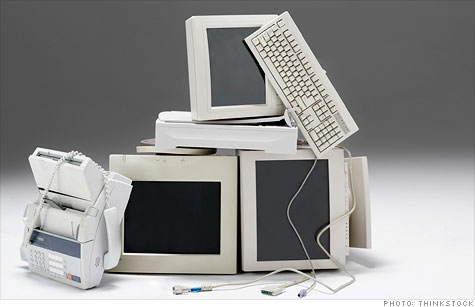Search News

Sure, there have been innovations in hardware, but most have been under-the-hood improvements to devices that already exist on the market.
NEW YORK (CNNMoney) -- Quick, name the last revolutionary consumer electronic device.
Did you say the iPad? That debuted two years ago. The iPhone? That launched in 2007. The high-definition television? Those have been out for more than a decade.
Today's device market is a field of smartphones, tablets, personal computers, and other gadgets that are substantially faster than last year's devices, but they don't really do anything remarkable or extraordinary that their predecessors couldn't.
Sure, there have been innovations in hardware, but most have been under-the-hood improvements to devices that already exist on the market.
Intel's (INTC, Fortune 500) 3D microchips are a marvel of computing, but they'll be put into the same PCs that haven't really changed form or functionality in decades. Smartphones now all look like the same thin, black rectangles, and the only real change to the category over the past few years has been faster speeds and better cameras. The flashiest new gadgets are ultrabooks -- essentially just a thinner version of the laptop.
The primary differentiator between one gadget and the next these days is the software running on it. That's where the technology revolution now plays out.
Exhibit A: The iPhone 4S, which had the strongest sales debut of any iPhone. Its hardware was essentially exactly the same as its immediate predecessor's, only with a faster processor. But the phone was hailed for Siri, the on-board personal assistant that became the device's main selling point.
The Samsung Galaxy Nexus, the latest "Google phone," debuted in December to some excitement -- not because of its design or tech specs, but because it was the first gadget to showcase the latest version of Google's (GOOG, Fortune 500) wildly popular Android operating system.
The big fanfare recently has surrounded applications and features. There's Facebook's new Timeline, Microsoft's (MSFT, Fortune 500) Windows 8, Mac OS X Lion, the iPhone's new Gmail app, Path, Pinterest... the list goes on.
Software updates are greeted with eager anticipation. But when was the last time you heard anyone speak about device specs, bragging about their PC's hard drive, memory or processor? Consumer electronics are becoming a simple conduit -- a dumb pipe for scintillating software.
That's because the real "magic" behind Siri and most applications today doesn't even happen on the device level. The cloud computing movement has transferred the processing power away from consumer devices and onto large-scale server farms. In an instant, a smartphone can tell its user where the nearest hospital is. A PC can search the entirety of the categorized Internet. And a tablet can play your favorite TV show.
One day in the not-so-distant future, consumer devices will be able to run programs as advanced as IBM's (IBM, Fortune 500) Watson, the software that beat two human contestants at Jeopardy! and captivated a national television audience a year ago. IBM expects that a version of Watson will be available in hospitals, running on consumer devices like PCs, smartphones and tablets.
How much power a particular device has is almost irrelevant now, so long as it has an Internet connection.
Take Amazon's (AMZN, Fortune 500) Kindle Fire, deliberately positioned as a stripped-down alternative to Apple's (AAPL, Fortune 500) iPad at a significantly lower price point. Though its functionality is more limited than the iPad's, even critics who panned the tablet noted that the device could handle most of the tablet tasks that people do on a day-to-day basis.
The power of the cloud and growing sophistication of software over the past few years has made consumer electronics a revolution of the past.
This year's Consumer Electronics Show in Las Vegas opens Tuesday, but don't expect anything Earth-shattering. This is no longer the gathering that brought you videocassette recorders, digital watches, camcorders and Blu-ray discs. This is now just the show that presents the latest versions of the same old conduits that bring us great software. ![]()